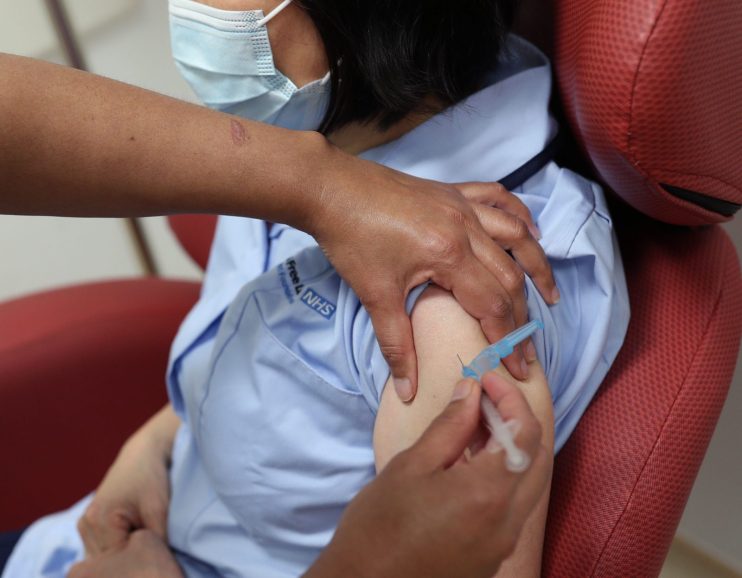Two Pfizer doses give 95 per cent protection against Covid-19 infection, illness and death: first nationwide study

Two doses of a Covid-19 vaccine developed by Pfizer and BioNTech can provide more than 95 per cent protection against infection, severe illness and death, according to the first nation-wide data from Israel.
A single dose of the jab, meanwhile, is associated with 58 per cent protection against infection, 76 per cent against hospital admission, and 77 per cent against death, research published in the journal The Lancet suggests.
First of its kind
The findings are based on a national-level assessment of the effectiveness of the vaccine and is thought to be the first observational evaluation of its kind.
Israel currently leads the world in Covid-19 vaccinations, with more than more than half (56%) of the population jabbed with two doses of the Pfizer/BioNTech vaccine.
New cases of Covid-19 have dropped dramatically since the country’s vaccination programme began, from a peak of more than 10,000 a day in January to a few hundred in March when lockdown was lifted.
Israel’s economy has since almost fully reopened, with people going to sporting events and concerts as restrictions on outdoor crowds continue to loosen.
The researchers said their study highlights the importance of fully vaccinating adults against Covid-19, but added that challenges remain to get the pandemic under control.
These include uncertainty about how long immunity lasts – from both vaccines and natural infection, and the emergence of variants that may be resistant to vaccines.
Lead author Dr Sharon Alroy-Preis, of the Israeli ministry of health, said: “As the country with the highest proportion of its population vaccinated against Covid-19, Israel provides a unique real-world opportunity to determine the effectiveness of the vaccine and to observe wider effects of the vaccination programme on public health.
“Until this point, no country in the world had described the national public health impact of a nationwide Covid-19 vaccination campaign.
“These insights are hugely important because, while there are still some considerable challenges to overcome, they offer real hope that Covid-19 vaccination will eventually enable us to control the pandemic.”
National pandemic surveillance data
The researchers analysed data between January and April 2021, using the national pandemic surveillance data recorded by Israel’s ministry of health.
During this time, the UK variant accounted for a vast majority of infections in the country.
By 2 April, 72 per cent of people over 16 years, and 90 per cent of those over 65 years, had received two doses of the Pfizer/BioNTech jab.
Results showed that for all people over the age of 16 years, the vaccine provided 96.5% protection against infection, 98 per cent protection against hospital admissions and 98.1 per cent protection against death, 14 days after the second dose.
Protections among the elderly were as strong as those for younger people, the researchers said, with those over 85 getting 94.1 per cent protection against infection, 96.9 per cent against hospital admission, and 97 per cent against death, a week after receiving their second dose.
Analysis also showed daily infections continued to decline as more people received the vaccine.
Dr Luis Jodar, senior vice president and chief medical officer, vaccines, at Pfizer, US, said: “As vaccination programmes continue to ramp up around the world, more data is needed urgently about the effectiveness of the Pfizer/BioNTech vaccine against severe disease and death, and about the levels of protection it provides to elderly people.
“Research examining long-term vaccine effectiveness will ultimately play a vital role in tackling the pandemic.”
Response
Commenting on the research, Jonathan Ball, professor of molecular virology at the University of Nottingham, said the new data from Israel confirms that the Pfizer/BioNTech vaccine “provides very high protection from serious Covid-19 disease and death – even in older more vulnerable people”.
He said: “Importantly, the study shows that two doses of the vaccine significantly increase levels of immunity and protection.
“This is why it is important that people get both doses, and if UK vaccine policy changes, to get a third dose if offered in the autumn.”
Prof Ball said that as new coronavirus variants emerge, “topping up your immunity with the vaccine boost will be even more important” as the virus acquires genetic changes that may make it more resistant to immunity generated by vaccines or following natural infection.
He added: “Therefore, it will be important to continue to monitor the potential impact of virus change and vaccine effectiveness.”